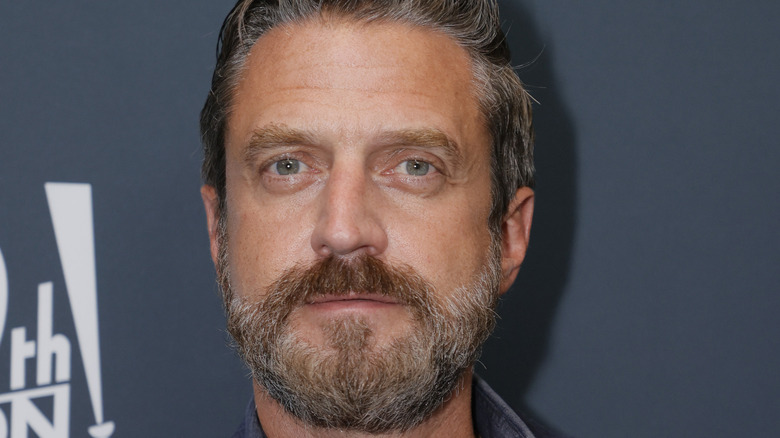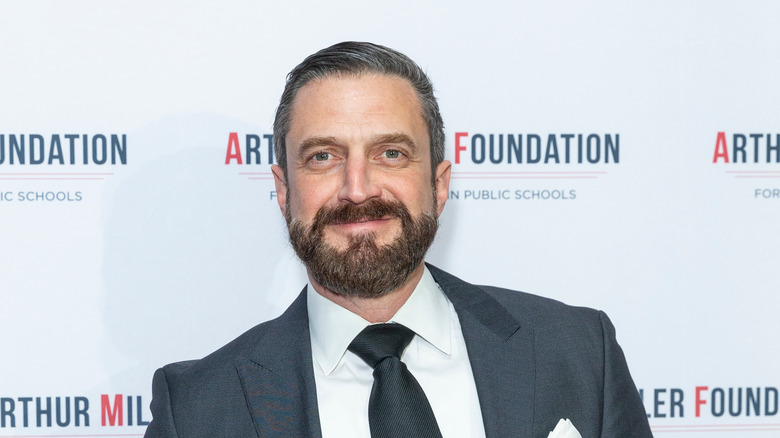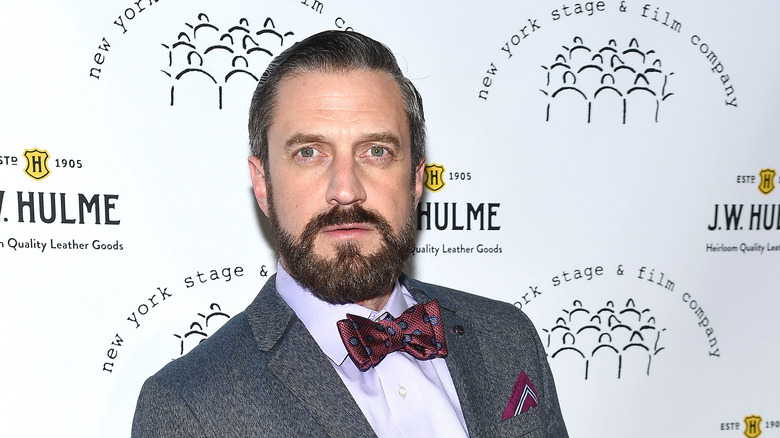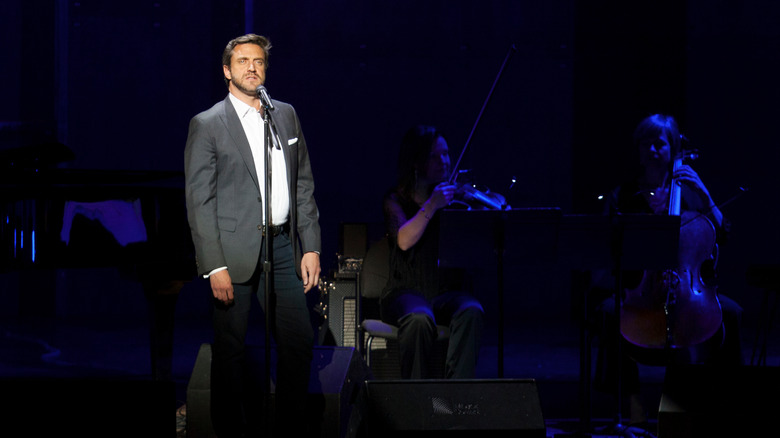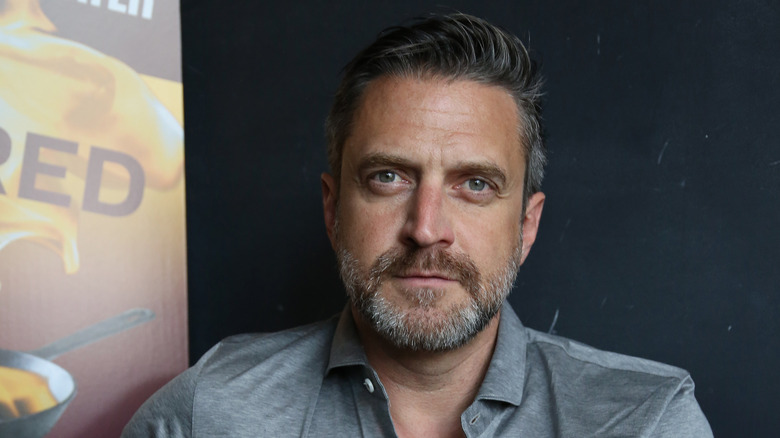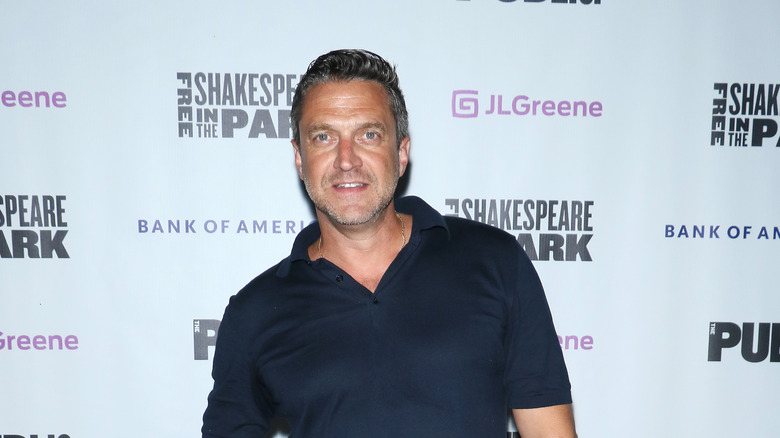Raúl Esparza Opens Up About Defending An Axe Murderer In Candy - Exclusive Interview
Raúl Esparza is nothing if not versatile. Over the course of his professional acting career, he's taken roles in everything from Shakespearean dramas to Stephen Sondheim musicals to TV shows including "Pushing Daisies" and "Law & Order: Special Victims Unit." No matter what character he's portraying, he throws himself into the role with thought and passion. His efforts have paid off: He's been nominated four times for Tony awards and has won several other major awards for his acting, including the Theatre World Award and the Drama Desk Award, according to his website.
His latest role, as defense attorney Don Crowder in Hulu's true-crime miniseries "Candy," allows Esparza to put his talents on full display. In "Candy," Crowder is an attorney with boundless self-confidence and zero criminal defense experience who doesn't know what he doesn't know. While in theory, this makes him the worst possible person to be defending a murder suspect, it also gives him a passion driven by the strength of his convictions that's fascinating to watch. In this exclusive interview, Esparza shares what he's learned about his complicated character.
Raúl Esparza was drawn by the passion and confidence of his character
What attracted you to your role in "Candy"?
I liked Don's bravado. I liked the humor in the piece. I liked the sickness of the piece, too. I was attracted to the fact that he was completely audacious for a first-time trial attorney who managed to really pull off some extraordinary accomplishments without the experience behind them. I also liked his 100% faith in his client, so that it allowed me to dive into the complete belief in the story and not ask any questions — play someone who went 100% in one direction and then go 100% in the other, within the span of a nanosecond.
He had a very unconventional attitude and set of strategies in the courtroom. Do you have any idea what his motivations were for doing what he did, or why he was he the way he was?
He believed in her completely. We know that Don Crowder himself had undiagnosed bipolar disorder, which, sometimes they say, in terms of manic episodes, it makes you feel invincible. He thought he was invincible. The other side of that is a great deal of fear and sadness. That plays out in his life later, which isn't anything the series gets into, though. I'm lobbying for a second season where we spend time with Don, but I feel like he went 100% in the direction that he went because he believed in it completely. He had an unshakable faith in his ability to accomplish this, and also in her, in Candy. She's a friend and she's someone that he took at face value, and Don tells the truth.
I don't think he's ever playing a game here, and that's the way he approached this. He saw it in very simple terms. Whether people watching the series see it in simple terms is really not my problem. My problem is to be sure that I play someone as absolutely honestly as possible. Then, [letting] the viewers make up their minds about whether or not we were up to something or he was up to something or Candy was up to something — that's part of what's really fun about the series. You can take everything two ways on it. That's exactly why he went the way he went with the trial.
Raúl Esparza researched the real Don Crowder thoroughly
It sounds like you've done a lot of research on the real case. Did you start your research before you started shooting or during the shooting?
Yeah, absolutely. I'm a big reader, so I liked reading a lot about the case and we had trial transcripts and photographs of the crime scene, and we had interviews with the people who were involved and in attendance in the courtroom or at the police station, or we spoke ... The creators spoke to a lot of the principals involved, but not necessarily the characters we were playing. I couldn't speak to Don.
I looked for audio and video of Don. I tried to find how he felt and looked and sounded, made some decisions to not play him exactly the way he looked in his face. Everything else was a lot of fun to try to emulate, even down to the cadence of the way he spoke and the way he said very particular words, because he had an incredibly specific way of speaking. That was fun. All those things are colors you get to use. It's a palette, and you get to decide if you're painting in blues and red and greens and then narrow it down, and it gives you the opportunity to create some really rich stuff because you're pulling from all that research. I always loved it.
Sounds like fun. So what were the most interesting things that you learned about Candy or about Don?
One of the most interesting things about Don is [that] his lack of experience in the courtroom didn't seem to affect the work at all, and his ability to play the publicity game and the press and the police against the press was pretty fantastic. I thought he would've had a hell of a lot more experience at what he was doing, but he was flying completely by the seat of his pants, and that was thrilling. It was a little bit of a rollercoaster ride that he was on. It was great to play that in him. I also loved his ambition, his athleticism, which was fun to play around with, it felt like it was important to be ... I couldn't possibly be as fit as he was, but I try to emulate some of that. I was working out every day because he felt different and I wondered what that was.
What does it mean to be a former football player who becomes an attorney and is willing to drive with all the energy he had on the field into these court cases, and finding the physicality of that kind of person who thinks big and thinks like everything is a play out of field? That was a lot of fun. It's a rough, visceral energy. It's great to play someone like that. I tend to be a lot more heady. He wasn't, he went for it, and went for it hard. That was fun and surprising to do.
The relationships between the characters in Candy added extra complexity to his role
It sounds like it. What about his relationship with Candy? That seems kind of interesting. Would you shed a little light on that?
Candy was one of the members of the church, and I don't think they were incredibly close, but they knew each other over the years. She came to him because as things got more and more heated on her. She came to him asking for advice, and he knew enough to say that he was not going to be the attorney to represent her. Little by little, he came to believe that he needed to be the one to run her case. They are clearly friends, but they are also clearly antagonists. She resists his approach. She wants her story told in a particular way that Don chooses not to. There's a tension between them. That was a lot of fun to play with and was surprising because she had to put her life in his hands, and he was pretty unconventional about the way he went about defending her.
She was having a very hard time with that. You've got both this thing about Candy that — we know anybody from church group that we go to or anybody from work or we sort of know casually, which is what they mostly were, to then [become] someone who [is] responsible for your life and who you might resent for that. In the same way, Jessica Biel and I had to put each other in each other's hands. I had to carry her. She had to carry me. Much of my relationship on screen was about making her the hero of the story in my version.
When Melanie Lynskey would walk on set, to look at Melanie and realize that there was a massive human tragedy at the heart of this was sobering every time. That relationship was triangulated, and with the Robert Udashen character, which Jesse Gallegos plays brilliantly, [it's an] interesting trio and quartet.
He worked to keep his Law & Order: SVU character from creeping into his role in Candy
You've also played a prosecutor on Law & Order: SVU for many years. Did that experience inform the way that you portrayed Don as a defense attorney?
No. I thought that they needed to be very different characters. As a matter of fact, I was afraid that any aspect of Barba would creep in, because you stand up in a courtroom and Barba begins to show up ... That character's in your DNA and you played him for almost seven years, and you keep coming back to him. Barba is slick, aggressive, utterly brilliant, Harvard educated, [and has a] huge chip on his shoulders. He dresses the way he dresses because he dresses to intimidate and he's got that deep relationship with Liv. He's got an arrogance about him that comes from massive experience and intelligence and ability to turn people's words on them.
I find him beautifully written because he's written like a bad guy who happens to be very good at heart. None of that could inform Don. I had to throw it away every time I would get up; if I felt that stuff creeping in, I had to throw it away. What was great was that Don's cadence is different. His dialect is different. The shoes are different. I'm in boots, I'm in '70s clothing, I've got a mustache and red hair and I don't see myself in the mirror. I don't see any aspect of Barba. It's a courtroom, but that's where the similarities end.
Interesting. What do you think was the most challenging part of your role as Don Crowder?
Playing him with a great deal of dignity and bravura, and giving all the comedy implied in that and all of his bad-assery total free reign without ever commenting on it or making him silly. That was quite challenging to do, [along with] finding that line you walk between being funny and dealing with the reality of the horror of the situation they were in. He was a damn good trial lawyer, and he might be a hell of a lot of fun to spend time with, but he was really good at what he did. I don't think he even knew that. [It] was a challenge to do all that without letting it slip into comedy completely.
Performing on stage and on camera bring different rewards—and similar challenges
Switching gears a little bit, you've been alternating between theater and TV and film for several years. Is it challenging to switch between the two modes of acting?
No, not at all. They inform each other in a great way. Being on stage with an audience in front of you means that you are having what I like to call a "sacred experience" every night. The conversation with the audience changes the performance. On camera, the camera is the most loving audience you could ever have. It's a hell of a lot closer even than the first row; the camera can read your mind. I really believe that. You have to trust it, and it falls in love with you.
So much of acting for me is about listening and what the other actors do. That's true on stage as it is true on screen. You inhabit that world for a little while, and take in what the other people are doing, [which] makes you better than anything you came up with by yourself.
You roll with it. They're very different mediums, but the discipline is the same. Sometimes, being on screen, it can be even more exhausting because you have to think twice as hard and you're not trying to reach the back row, but performing on stage, you get a hell of a lot back. Every night, I feel always feel jazzed when I leave the theater and I want to stay up 'til 4:00 in the morning, because you have so much adrenaline. We were all in it together that night we made this thing. Aside from those variations, it's still acting. It's still inhabiting another person and trying to be honest about that person and think like them for a little bit of time.
What projects do you have planned next?
I'm filming a series called "Retreat" right now for FX, and I just finished the finale of "Law & Order SVU," and I did a concert a few weeks ago. I'm looking forward to a nice break. I'm looking forward to the beach.
"Candy" will premiere on Hulu Monday, May 9, kicking off a five-night event leading up to the finale on Friday, May 13.
